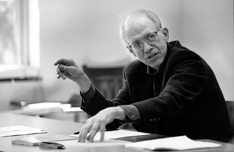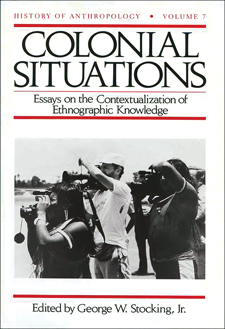Colonial
Situations
Essays on the Contextualization
of Ethnographic Knowledge
Edited by George W. Stocking, Jr.
History of Anthropology (VOLUME SEVEN)
Richard Handler, Series Editor
The relation of anthropology to
colonialism and imperialism became a burning issue for anthropologists
in the mid-1960s.
As European colonies in Asia and Africa became independent nations,
as the United States engaged in war in Southeast Asia and in
covert operations in South America, anthropologists questioned
their interactions with their subjects and worried about the
political consequences of government-supported research. By 1970,
some spoke of anthropology as “the child of Western imperialism”
and as “scientific colonialism.” Ironically, as the
link between anthropology and colonialism became more widely
accepted within the discipline, serious interest in examining
the history of anthropology in colonial contexts diminished.
This volume is an effort to initiate a critical historical consideration
of the varying “colonial situations” in which (and
out of which) ethnographic knowledge essential to anthropology
has been produced. The essays comment on ethnographic work from
the middle of the nineteenth century to nearly the end of the
twentieth, in regions from Oceania through southeast Asia, the
Andaman Islands, and southern Africa to North and South America.
The “colonial situations” also cover a broad range,
from first contact through the establishment of colonial power,
from District Officer administrations through white settler regimes,
from internal colonialism to international mandates, from early
“pacification” to wars of colonial liberation, from
the expropriation of land to the defense of ecology. The motivations
and responses of the anthropologists discussed are equally varied:
the romantic resistance of Maclay and the complicity of Kubary
in early colonialism; Malinowski’s salesmanship of academic anthropology;
Speck’s advocacy of Indian land rights; Schneider’s grappling
with the ambiguities of rapport; and Turner’s facilitation of
Kaiapo cinematic activism.
 George W. Stocking, Jr. (1928–2013) was the Stein-Freiler Distinguished
Service Professor in the Department of Anthropology and the Committee
on the Conceptual Foundations of Science at the University of
Chicago. He was editor of the History of Anthropology series published
by the University of Wisconsin Press and the author of After Tylor: British Social Anthropology, 1888–1951;
Victorian Anthropology; Race, Culture, and Evolution; The Ethnographer’s Magic; and Delimiting Anthropology. In 1993, he was
awarded the Huxley Medal of the Royal Anthropological Institute. George W. Stocking, Jr. (1928–2013) was the Stein-Freiler Distinguished
Service Professor in the Department of Anthropology and the Committee
on the Conceptual Foundations of Science at the University of
Chicago. He was editor of the History of Anthropology series published
by the University of Wisconsin Press and the author of After Tylor: British Social Anthropology, 1888–1951;
Victorian Anthropology; Race, Culture, and Evolution; The Ethnographer’s Magic; and Delimiting Anthropology. In 1993, he was
awarded the Huxley Medal of the Royal Anthropological Institute.
Media & bookseller inquiries regarding review copies, events, and interviews can be directed to the publicity department at publicity@uwpress.wisc.edu or (608) 263-0734. (If you want to examine a book for possible course use, please see our Course Books page. If you want to examine a book for possible rights licensing, please see Rights & Permissions.)
|
|

October 1991
LC: 91-50327 GN
348 pp. 6 x 9 23 halftones, 2 maps
“Provides fresh insights for those
who care about the history of science in general and that of
anthropology in particular, and a valuable reference for professionals
and graduate students.”
—Choice
“Among the most distinguished publications
in anthropology, as well as in the history of social sciences.”
—George
Marcus, Anthropologica |
 George W. Stocking, Jr. (1928–2013) was the Stein-Freiler Distinguished
Service Professor in the Department of Anthropology and the Committee
on the Conceptual Foundations of Science at the University of
Chicago. He was editor of the
George W. Stocking, Jr. (1928–2013) was the Stein-Freiler Distinguished
Service Professor in the Department of Anthropology and the Committee
on the Conceptual Foundations of Science at the University of
Chicago. He was editor of the 